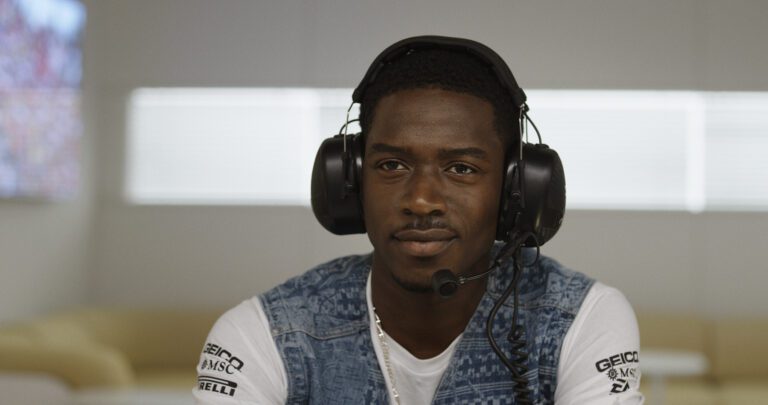Kahleen Crawford has one of those brilliant, soothing Scottish accents that make you relax as soon as you hear it. That comes in handy when you’re dealing with nervous actors, who often need to be disarmed when they come into her audition room. It also works on journalists interviewing her.
Over the years, a childhood interest in observing people and their behavior has grown into a thriving career as a casting director, one that has led her to cast such Oscar-nominated films as Living and The Lost Daughter. Most recently, she worked on the Apple TV adaptation of Edith Wharton’s The Buccaneers, all episodes of which are now streaming, and the acclaimed film All of Us Strangers, starring Paul Mescal and Andrew Scott. She spoke with us from her office in London.
How did you get into casting?
I graduated from Glasgow University, I did film and television and theater studies together and I was a runner for a while in London. I absolutely hated it [and was] treated horribly. I came home in a fit of pique and, since I knew that I liked watching people, I thought about how I could apply that to my career. I applied for a job as an agent and had a long conversation with the agent who said, “I don’t think you want to be an agent, I think you want to be a casting director.” She gave me a phone number.
Gillian Berrie is a producer. She has a company called Sigma Films, but she had set up this casting company in Glasgow called Big Fish. When I went in to meet her, she said to me, “I tell you what, you can either work in the casting company, or you can learn to be a producer and be my assistant.” She was looking for two people. I didn’t have any clue, but I very much was committed to the casting idea, though I didn’t know what it was. I just sort of felt, there’s something about this people-watching thing that works here.
It’s interesting that you chose a career based on that interest.
I spend so much time watching people and doing a version of reading energy or watching mannerisms or listening to their voice and trying to understand why they speak the way they speak, in terms of where they’re from, maybe influences of places they’ve lived. I study body language so much. I’ll look across the room at a party instead of having a conversation with someone immediately next to me. I’m just nosy.
I thought, “How can I work with people and performers?” That’s the reason that I applied for that job. I don’t think I had any clue what I was doing. At all. I just didn’t have any clue what the options were. I didn’t understand what casting was. My film studies were all about, you know, psychoanalysis and feminist theory, white balance on a camera, and what an editor’s job looks like.
I have always found it fascinating that film schools do not address casting at all, ever.
I went to an old university. The National is very academic, and no, certainly nobody taught us about casting. Interestingly, I went to the Harry Potter studios on Sunday, and they also don’t talk about casting. There’s all these signs up for production design, and you hear from the plasters and you hear from all of that, and there isn’t a little section for casting.
Do you think your fascination with watching people has helped you in your career?
I think the curiosity is probably more in the nonverbal stuff. In terms of how you apply that to casting, what story do I think people are telling me with the things that they are saying and the things that they aren’t saying? And how do you match those things up?
I suppose sometimes those things are conflicting, and that’s when you know, people are either hiding things or lying. You get to a stage where that can be useful, probably, because it also then tells you whether you believe the performance. Because it isn’t just about the things that the person is saying. It’s about all the things they aren’t saying, which is probably why a lot of directors cut to people when they’re listening, not when they’re speaking.
Would you say that your innate sense of studying people, and the skill you’ve honed over the years, has changed the way that you run a room?
When you’re trying to do that, you don’t always get it right, but the aim is to allow someone to have their best 15 or 20 minutes, and how can I do my best to let this person get the job? I think lots of the casting directors that you speak to say this. We want you to get the job. I think it also means that you have to be just as attentive to the person who you don’t think is as likely they’re gonna get this part because they can completely subvert your expectations for the better and also sometimes for the worse.
That segues right into my last question, which is what advice or piece of wisdom would you give to somebody coming in to audition for you?
An idea to consider is that this is the start of a relationship. There are actors in their mid to late 20s coming in, and I’ve known some of them since they were only eight years old.
Also, even when you think you’re not right for the part. If you’re an orange, and even if you think that we need a banana, come in and be the best orange. Because one, we may choose to change it, and two, maybe somewhere else that’s what we need. So come in and do the very best version of what you have to offer. Oh, and one other thing. If you’re an overthinker or you have a negative voice in your head, you struggle to control your thoughts when you’re under pressure, you only have to survive a 10 to 30-minute audition. Turn it off. Do all the shit talk to yourself after, if that’s the way that you operate in life, or you can’t stop yourself. But just for that audition, turn it off.
Casting directors use Casting Networks every day to discover people like you. Sign up or log in today to get one step closer to your next role.
You may also like:













